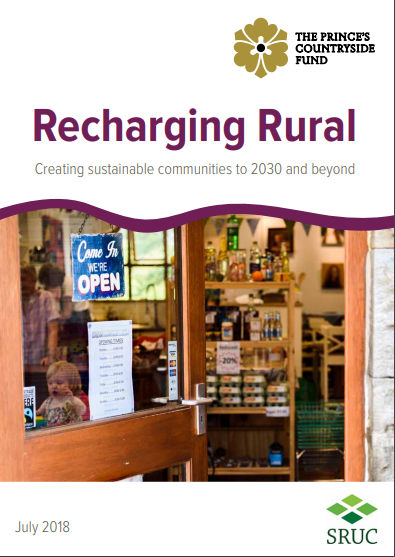Research reveals how communities tackle multiple challenges of rural living
7th Aug 2018

Rural communities are coming together to improve their quality of life but feel as though they are becoming more remote, according to research from The Prince’s Countryside Fund and Scotland’s Rural College.
A public survey looking in to how life is experienced in rural areas of the UK for the Recharging Rural report published in July received five times as many responses as expected. More than 3,000 people expressed their praise and concerns for the quality of life in rural communities, their thoughts on how life had changed over the past decade, and how they could make the most of future opportunities. Respondents repeatedly expressed their desire for improved infrastructure in the countryside, which they feel will help them to encourage young people and businesses to stay in, or move to, rural areas. Investment in digital connectivity is also a key concern.
Claire Saunders, Director of The Prince’s Countryside Fund said: “It is encouraging to hear how communities are taking action to address the challenges they face – respondents told us of more than 500 community led projects happening across the UK.
“These projects address feelings of isolation in rural areas and foster a sense of community spirit and pride. Many of these projects typically deliver multiple outcomes, such as arts activities contributing to increasing personal confidence, or food projects linking people with the land and with each other.”
“However, rural respondents told us that their lived experience is too often and too easily overlooked, and that living in rural areas can make them feel invisible owing to a lack of joined up rural thinking.”
Professor Sarah Skerratt, Director of Policy Engagement from Scotland’s Rural College said: “Remote rural cannot be defined solely by geography – the research has shown that people’s personal experience must also be taken in to account.
“An overwhelming majority of respondents told us that the biggest barriers faced by people living in a remote rural area is a forced reliance on private transport to access anything; limited or poor infrastructure in rural areas, including a lack of access to shops and services; and the ongoing issue of poor digital connectivity. The most significant challenge for the future is affordable rural housing.”
More detailed descriptions showed that the ‘disabling’ characteristics of remoteness are then combined with geographical and physical aspects, particularly on the UK’s islands. Findings from the research also show that rural remoteness is a process, and that feelings of remoteness have increased over the past 10 years.
A minority of respondents have seen improvements in broadband and mobile coverage, and in opportunities for community empowerment through asset and land purchase, but the majority feel that remoteness is happening to them through the increased unaffordability of housing, the decline in the number of rural businesses and employment prospects, and the outmigration of young people.
The centralisation of services such as schools, libraries, health services and leisure facilities, coupled with the effect of commuting and mass housing developments, are also seen as contributing to community breakdown.
Respondents to the report make it clear that they are very keen to engage with policy makers and with other communities, and are full of ideas, energy, and creativity that they wish to share. Based on the survey responses, the report makes several recommendations to rural stakeholders, policy makers, and communities as to how things can be improved in rural areas, with a focus on encouraging cohesive policy across the UK and aiding collaboration.
The full Recharging Rural report can be read at http://www.princescountrysidefund.org.uk/research